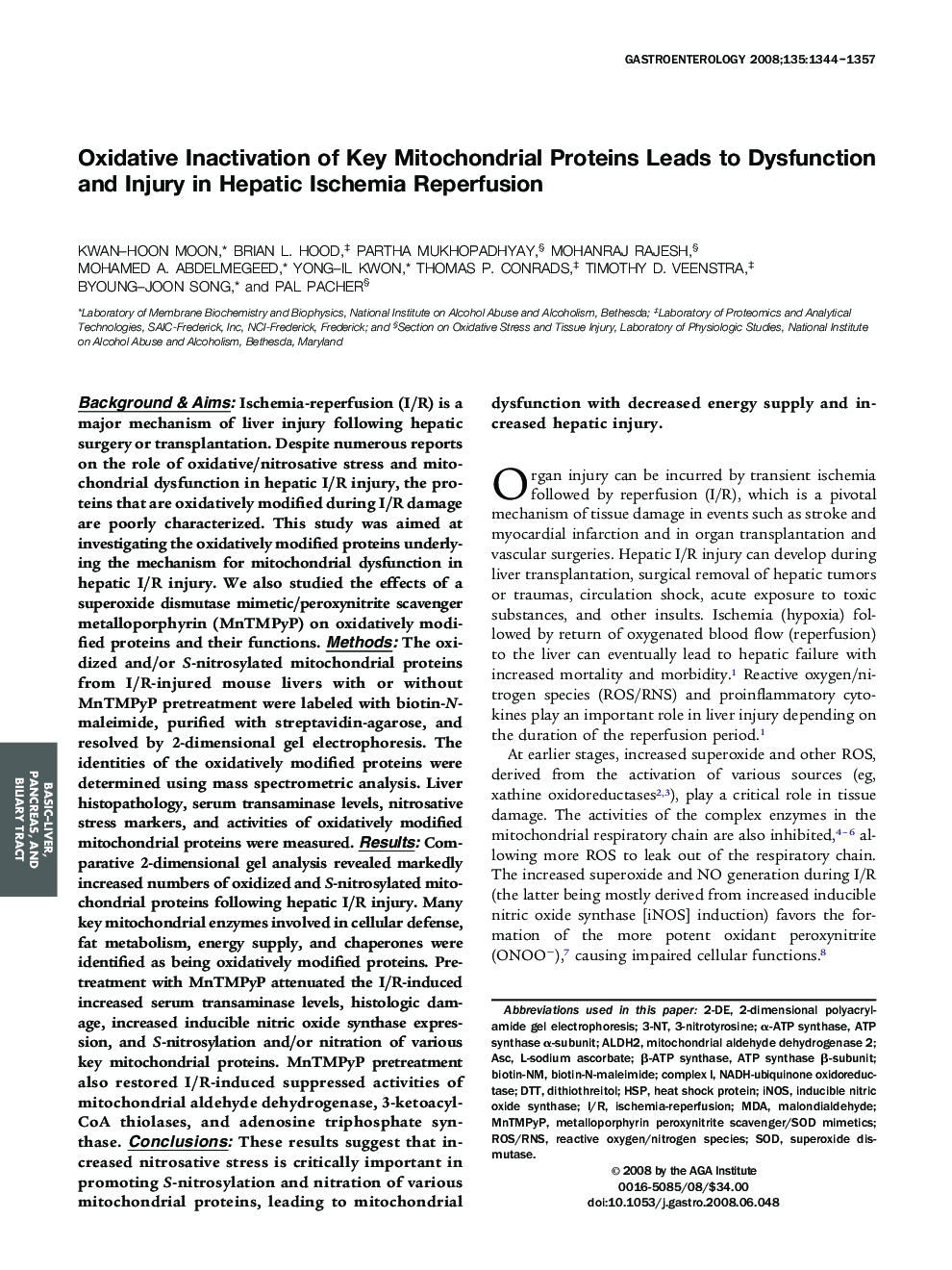| Article ID | Journal | Published Year | Pages | File Type |
|---|---|---|---|---|
| 3299158 | Gastroenterology | 2008 | 14 Pages |
Abstract
Background & Aims: Ischemia-reperfusion (I/R) is a major mechanism of liver injury following hepatic surgery or transplantation. Despite numerous reports on the role of oxidative/nitrosative stress and mitochondrial dysfunction in hepatic I/R injury, the proteins that are oxidatively modified during I/R damage are poorly characterized. This study was aimed at investigating the oxidatively modified proteins underlying the mechanism for mitochondrial dysfunction in hepatic I/R injury. We also studied the effects of a superoxide dismutase mimetic/peroxynitrite scavenger metalloporphyrin (MnTMPyP) on oxidatively modified proteins and their functions. Methods: The oxidized and/or S-nitrosylated mitochondrial proteins from I/R-injured mouse livers with or without MnTMPyP pretreatment were labeled with biotin-N-maleimide, purified with streptavidin-agarose, and resolved by 2-dimensional gel electrophoresis. The identities of the oxidatively modified proteins were determined using mass spectrometric analysis. Liver histopathology, serum transaminase levels, nitrosative stress markers, and activities of oxidatively modified mitochondrial proteins were measured. Results: Comparative 2-dimensional gel analysis revealed markedly increased numbers of oxidized and S-nitrosylated mitochondrial proteins following hepatic I/R injury. Many key mitochondrial enzymes involved in cellular defense, fat metabolism, energy supply, and chaperones were identified as being oxidatively modified proteins. Pretreatment with MnTMPyP attenuated the I/R-induced increased serum transaminase levels, histologic damage, increased inducible nitric oxide synthase expression, and S-nitrosylation and/or nitration of various key mitochondrial proteins. MnTMPyP pretreatment also restored I/R-induced suppressed activities of mitochondrial aldehyde dehydrogenase, 3-ketoacyl-CoA thiolases, and adenosine triphosphate synthase. Conclusions: These results suggest that increased nitrosative stress is critically important in promoting S-nitrosylation and nitration of various mitochondrial proteins, leading to mitochondrial dysfunction with decreased energy supply and increased hepatic injury.
Keywords
ASCmitochondrial aldehyde dehydrogenase 2MnTMPyPMDANADH-Ubiquinone oxidoreductaseALDH23-NTHspiNOS2-DEDTT3-nitrotyrosineI/RROS/RNS2-dimensional polyacrylamide gel electrophoresisischemia-reperfusiondithiothreitolSODinducible nitric oxide synthaseSuperoxide dismutasemalondialdehydeComplex IHeat shock proteinReactive oxygen/nitrogen species
Related Topics
Health Sciences
Medicine and Dentistry
Gastroenterology
Authors
Kwan-Hoon Moon, Brian L. Hood, Partha Mukhopadhyay, Mohanraj Rajesh, Mohamed A. Abdelmegeed, Yong-Il Kwon, Thomas P. Conrads, Timothy D. Veenstra, Byoung-Joon Song, Pal Pacher,
